Frequent heartbeat. What are the causes of heart palpitations
Are you scared or upset, is your heart ready to jump out? You have a rhythm disturbance - tachycardia. The frequency of blows is more than one hundred per minute. The attack is accompanied by weakness, anxiety, and nausea. With chaotic contractions, there is an uneven flow of blood into the ventricles of the heart. This leads to disruption and, as a complication, to heart failure. There are various methods to combat the symptoms of the disease. Among them are the treatment of tachycardia folk remedies at home. Simple recipes help relieve an attack and improve the condition.
How to treat tachycardia
There are many reasons for the appearance of tachycardia. When it is a consequence of diseases, the help of a doctor and treatment with medications are required. Tachycardia appears when the body is dehydrated and there is large blood loss. Sometimes the disease is associated with psychoses and neuroses. Tachycardia can occur as a result of:
- inflammatory diseases hearts;
- hypertension;
- obesity;
- myocardial infarction;
- anemia;
- adrenal tumors;
- fever with infectious diseases;
- diseases thyroid gland.
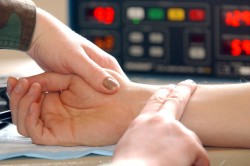
Rapid heartbeat occurs during times of stress or fear. Strong physical activity, drinking coffee and alcohol contribute to the appearance. Accompanies tachycardia in women during pregnancy and menopause. In these cases, you can fight the disease in the following ways:
- exclude alcohol and coffee;
- follow a diet;
- study physical therapy;
- massage the carotid artery;
- take herbal infusions;
- practice relaxation;
- use traditional medicine methods.
Folk remedies for palpitations

Traditional medicine suggests the use of:
- herbal decoctions;
- alcohol infusions using plants, berries, fruits;
- honey;
- dried fruits;
- nuts;
- pharmaceutical tinctures;
- essential oils.
Cooking recipe:
- Try mixing equal parts of pharmaceutical alcohol tinctures of hawthorn, valerian, and motherwort.
- Add the same amount of Corvalol to them.
- Shake everything up and put it in the cabinet.
- Take twenty minutes before meals, three times a day, 20 drops.
To relieve an attack of tachycardia, you need to make a mixture of essential oils and carry them with you. If necessary, place a couple of drops on a handkerchief or napkin and breathe. At the same time, inhale long and exhale short. It is allowed to rub the composition into the heart area. To prepare the product, mix equal parts of oils:
- lavender;
- pine trees;
- lemon balm;
- eucalyptus;
- peppermint.
Honey
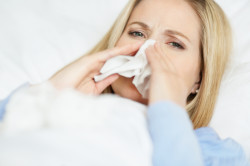
If honey is not contraindicated for you, you can use it to treat tachycardia. Prepare a product that will last you for two months. Take once daily. Do it slowly, one serving is 4 spoons. To prepare the composition:
- Take a kilogram of honey.
- Grind 10 heads of garlic.
- Add the juice of ten lemons.
- Mix in a jar.
- Leave it covered for a week.
To eliminate heart palpitations, take daily a mixture of 100 ml of honey and 2 tablespoons of bee bread: 3 teaspoons each. One more thing effective remedy– mixed 2 tablespoons of honey and half a glass of beet juice. This is a serving for 2 times, you should drink it during the day. Helps with tachycardia herbal tea with honey. Drink 2 tablespoons of decoction with a spoon of honey, 3 times a day. To prepare the product, you need:
- Put 2 parts of horsetail.
- Add 5 parts of hawthorn.
- Add three parts of knotweed.
- Pour a liter of boiling water.
- Leave for half an hour.
Herbal decoctions and infusions
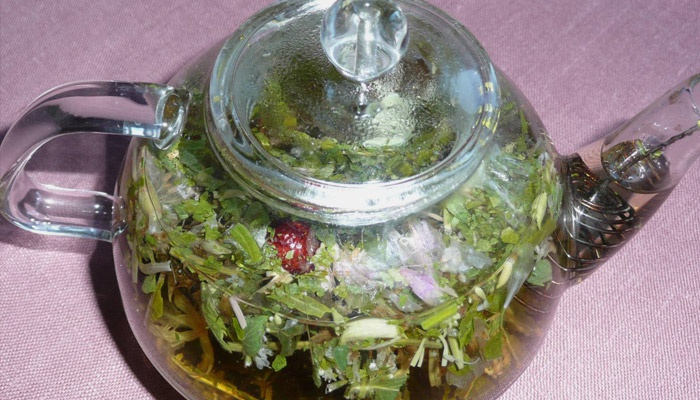
Particularly popular in the treatment of tachycardia are herbal infusions and infusions. You can prepare a decoction in a thermos by adding a spoonful of valerian roots and calendula flowers. Pour boiling water - two glasses - the product is ready in 2 hours. Take it for 3 weeks, 4 times a day, 100 grams. There is a recipe with four herbs. They are first mixed, then one spoon of the mixture is poured with a cup of water. Next, boil and leave for a couple of hours. Drink a serving before lunch, taking small sips.
Features of traditional treatment of tachycardia
If you are planning to start treating tachycardia with folk remedies, you should consider:
- intolerance to components so as not to cause allergies;
- patients with high blood pressure are not recommended to take alcohol tinctures;
- during pregnancy, you should agree on the treatment method with your doctor;
- medications with alcohol are taken for low blood pressure.
For hypertension

At high blood pressure The use of alcohol infusions is contraindicated. You can make this potion: put a spoonful of chicory herb in a glass of boiling water and leave for an hour. Drink 50 grams after meals. Homemade tea leaves will help you cope with tachycardia. For one serving you should take:
- green tea bag;
- a teaspoon of motherwort herb;
- 4 rose hips;
- 6 hawthorn berries.
At high blood pressure Tachycardia is treated with the following composition: 100 grams of almonds and 0.5 kg of lemon. The ingredients are crushed and poured with honey. Use for a month, a spoon before breakfast. A very pleasant medicine is made with dried fruits, honey and lemon. Take a spoonful morning and evening. For preparation, the following components are crushed and mixed in equal proportions:
- lemon;
- dried apricots;
- prunes;
- walnut;
- raisin.
At low pressure

If you have low blood pressure, you can relieve tachycardia at home using tinctures made with vodka. In the summer, you can collect meadow clover and pack it tightly glass jar. The grass should be poured with vodka and, closing the lid, left for a month. Take a teaspoon before meals. Another effective remedy that is taken an hour before meals - you need 10 ml, three times a day. For preparation:
- Squeeze the juice of a large lemon.
- Add 100 grams of cranberry, carrot, and chokeberry juice.
- Pour in a glass of vodka.
Very tasty and effective medicine for tachycardia can be prepared with berries. Take half a glass in the mornings and evenings. The recipe is as follows:
- Place the berries in layers in a jar.
- Sprinkle each with granulated sugar.
- Pour vodka.
- Keep for 3 weeks.
To prepare the composition you will need:
- three-liter jar with a lid;
- cup granulated sugar;
- viburnum berries – 1 liter;
- cranberries and rose hips - half a liter each;
- hawthorn – 1 liter.
During menopause

This period in life causes troubles and discomfort for women. In addition to dizziness and hot flashes, a rapid heartbeat is added - tachycardia, which can be cured with folk remedies. 15 drops of rue tincture help relieve symptoms: drop on a piece of sugar. You need to eat it after meals. In summer, you can try drinking juice squeezed from blooming yarrow. Take 2 spoons per day in three doses.
Using an infusion of a mixture of herbs and berries is effective. According to the recipe for collection, you need to take in equal parts:
- hawthorn;
- mistletoe;
- oregano;
- viburnum;
- chokeberry.
Drink half a glass of infusion twice a day. The cooking technology is simple, you need:
- Take two spoons of the mixture.
- Add a glass of boiling water.
- Keep covered for 15 minutes.
- Cool, strain.
In pregnant women
During pregnancy, the load on internal organs, which leads to heart rhythm disturbances. Treatment of symptoms of tachycardia with folk remedies at home in pregnant women is the only possible way. This is due to the fact that the use of drugs has many restrictions. How to treat tachycardia in this case? Here is a simple and delicious recipe. The prepared drink is drunk daily, 100 grams, before meals. To prepare, mix the juices:
- lemon – 100 grams;
- rowan - half a glass;
- cranberries – 80 grams;
- carrots - a glass.
A very simple collection of herbs: chamomile, valerian, mint. Add 3 teaspoons to a glass of boiling water and wait an hour. Drink half a glass daily. A more complex recipe will help fight tachycardia. The portion is enough to take in the morning and evening. Treat for two weeks, then take a break. To prepare you need:
- Take a large spoon of valerian root.
- Add a spoonful of lemon balm, dill seeds, and hop cones.
- Mix.
- Pour in 2 cups of boiling water.
- Keep covered until cool.
Video: how to treat tachycardia at home
The main organ of the circulatory system is the heart muscle. A person’s entire life depends on regular and harmonious contractions of the heart. The heart muscle beats from 50 to 160 times per minute, supplying blood to all parts of the body. During systole (the phase of muscle contraction), blood moves, providing the entire body with saccharides, fats, amino acids and oxygen. Diastole is the resting phase during which the heart muscle relaxes. Equal phase intervals ensure continuous operation of a healthy heart.
The structure of the heart muscle
If the periods of systole and diastole are shortened, as with tachycardia, the heart muscle cannot cope with its function and cannot adequately saturate the body with the necessary nutrients. Regular contractions with clear intervals between phases are called heart rhythm. Any disruptions in this complex system can lead to serious disturbances in the functioning of the heart.
With deviations in the rhythm, frequency and sequence of heart contractions, disturbances appear in different body systems. Heartbeat healthy person equals 50-90 beats per minute. Rapid heartbeat is a frequency of contractions of the heart muscle above 95 beats, which is accompanied by the following symptoms:
- nausea;
- twilight consciousness;
- panic attack;
- fainting states;
- dizziness;
- weakness.
Attention! Palpitations appear as quickly as they disappear. The duration of the attack is very variable: from a few seconds to a day. The heart rate often increases in hot-tempered, emotional and temperamental people. Mental and endocrinological disorders can also cause rapid heartbeat.
Why does rapid heartbeat occur?
It is necessary to understand that increased heart rate is not an independent disease, but a symptom. Physical activity, fear, anxiety, febrile body temperature - all this can cause an accelerated heartbeat. Sinus tachycardia, which occurs in response to such factors, is a normal variant. Pathological palpitations appear at rest and are caused by a specific disease.
Disturbances in the functioning of the nervous, digestive, endocrine systems, poisoning, febrile syndrome - all this can lead to pathological tachycardia. Often, obesity and physical inactivity can lead not only to increased heart rate, but also to heart disease.
The main factors of the internal and external environment that provoke a strong heartbeat at rest:
- taking psychoactive drugs: cocaine, amphetamine or coffee;
- psycho-emotional stress;
- chronic fatigue syndrome;
- alcoholism;
- insomnia;
- excessive physical activity;
- uncontrolled use of medications;
- hypocalcinosis;
- hypomagnesemia.
It should be borne in mind that an excess amount of calcium leads to ventricular fibrillation, and magnesium leads to bradycardia. When you have a cold (bacterial or viral), your body temperature often rises, which causes your heart to beat faster. Chocolate contains theobromine, which chemical structure is similar to caffeine and binds to the same adenosine receptors, blocking their work, so it can also provoke an attack of tachycardia.
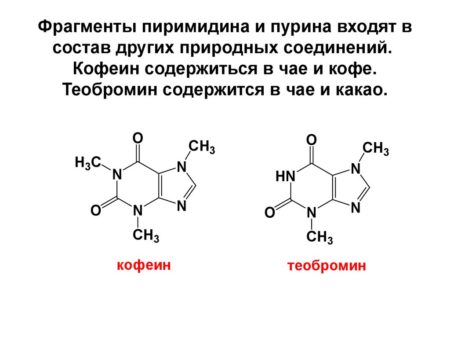
Caffeine and theobromine
The most common diseases and hormonal changes that cause heart palpitations are:
- congenital and acquired heart defects;
- coronary heart disease;
- myocardial dystrophy;
- inflammatory heart diseases (myocarditis, pericarditis);
- structural abnormalities of the heart muscle;
- hypertension above 160/100;
- menopause;
- malignant or benign tumors.
A sharp decrease in blood pressure (hypotension) due to blood loss, anemia or purulent infections can also lead to increased heartbeat. There are many reasons why heart palpitations may occur. To clarify the diagnosis or find out the cause of the pathological condition, you must contact your doctor.
Important! Drinking coffee in large quantities causes heart palpitations. In small to medium doses, caffeine does not inhibit GABA receptors and stimulates the vagus nerve, which can cause the opposite effect – bradycardia.
Arrhythmia affects the manifestation of pathological tachycardia. Atrial fibrillation is one of the most common types of heart rhythm disturbances that lead to life-threatening heart palpitations - ventricular fibrillation. Occurs in old age along with coronary disease hearts. In teenagers atrial fibrillation occurs due to congenital defects or in the presence of pathology of the thyroid gland.
If your palpitations are accompanied by paleness, dizziness, trembling, and fatigue, this most likely means you have anemia. At iron deficiency anemia The level of hemoglobin in the blood, a protein globule that transports oxygen into cells, decreases. It occurs in women during menstruation, accompanied by heavy blood loss. Tachycardia may appear before menstruation as a symptom of premenstrual syndrome. Palpitations may occur due to a serious illness - leukemia, which for a long time is asymptomatic. Sometimes minor symptoms are predictors of serious diseases, so you need to see a doctor to find out their origin.
What to do if your heart beats strongly?
Feelings of fear, anxiety, hyperhidrosis, hypochondria are symptoms of a condition called a panic attack. Often heart palpitations occur due to mental disorder, and sometimes with a rapid heartbeat occurs panic attack are inversely dependent quantities. Severe anxiety does not pose any threat to the patient's life, but can cause minor discomfort and impair quality of life. Sedatives, which are taken strictly as prescribed by the attending physician, will help reduce the manifestation of anxiety.
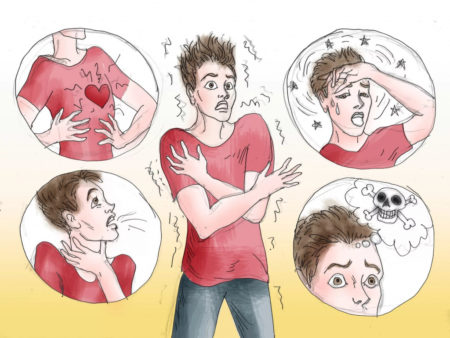
Panic attack
In addition to the above diseases, the causes of a strong heartbeat can be very simple - chronic stress, malnutrition, conflicts in the family or at work. Tachycardia is often observed in a lying position.
Children's tachycardia: causes and treatment
In children, the heart can beat up to 160 times per minute, and this is considered normal. A child's heart rate fluctuates over a wide range: from 110 to 160 beats. Some boys or girls with tachycardia may develop heart defects, such as ventricular hypertrophy. For children only extreme cases Beta blockers or calcium channel blockers are prescribed to eliminate tachycardia, since the condition often goes away on its own and does not require any intervention.
Factors and diseases affecting the heartbeat of children:
- age;
- the time when the pulse is measured (during sleep or while awake);
- body temperature;
- ambient temperature;
- Kawasaki disease;
- congenital heart defects.
If the child turns pale and his heartbeat quickens, it is necessary to urgently seek first aid. Make sure your child does not drink hot or cold water, and before the ambulance arrives, open the windows to provide fresh air. If you don’t know how to calm a teenager, drop 10 drops of Valocordin and let him drink until the ambulance arrives.
What types of tachycardia are there?
To make a correct diagnosis it is necessary to carry out differential diagnosis and find out how the patient’s accelerated heartbeat manifests itself: suddenly or constantly. Paroxysmal tachycardia is a sudden rapid heartbeat that occurs suddenly at a certain time of the day and just as quickly returns to normal. If the heart constantly beats quickly and the symptoms do not subside, this is chronic tachycardia. Atrial and ventricular tachycardia are distinguished.
The source of frequent electrical impulses during ventricular tachycardia is the upper chambers of the heart - the ventricles. This type of tachyarrhythmia can develop into a life-threatening condition - ventricular fibrillation, which is often observed during myocardial infarction. With the ventricular form of rapid heartbeat, contraction occurs not of the entire muscle, but of individual cells. The outflow and flow of blood to vital organs is disrupted, hypoxia occurs, and the person may die.
Cardiac glycosides are medications used to treat heart failure and may cause heart palpitations. You can take cardiotonic drugs only if prescribed by your doctor.
Atrial tachycardia is not accompanied by disturbances in heart rate, its course is favorable. Often oxygen starvation cardiomyocytes, caused by neuroendocrine or electrolyte changes, leads to deterioration of conduction in the atrioventricular node. This type of tachyarrhythmia is accompanied by the following symptoms:
- nausea;
- vomiting;
- chills;
- fainting states;
- dizziness;
- weakness.
High blood pressure is a common companion to this condition, but high blood pressure stimulates the vagus nerve, which can lead to bradycardia. High blood pressure often leads to weakness and worsens the patient's well-being.
How is the cause of heart palpitations diagnosed?
At the initial stage, the doctor studies the child’s medical history and conducts an examination. If you suspect pathological tachycardia A number of examinations are prescribed that will help build a more objective picture:
- biochemical and clinical analysis blood;
- ECG, stress test;
- Ultrasound, MRI or echocardiography of the heart;
- electrophysiological study.
If high blood pressure is suspected, tonometry is done, and even if the blood pressure is high, drug treatment, consisting of drugs that reduce it. Often, when children see medical personnel, their blood pressure rises and their heart rate increases. During paroxysmal attacks, a Holter ECG is performed, which records changes in the functioning of the heart throughout the day. Often, a child begins to have seizures before falling asleep or in the morning; they can be easily tracked using a Holter.
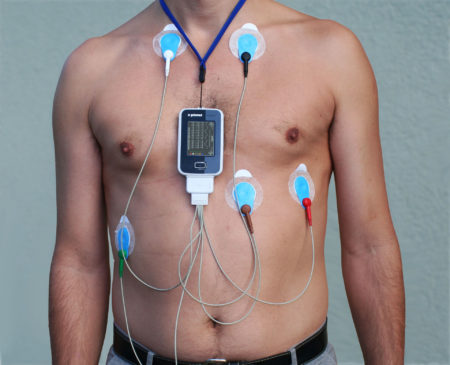
ECG holter
How to treat rapid heartbeat?
Drug therapy is an option for patients with heart palpitations who cannot relieve the arrhythmia on their own. The frequency of tachycardia attacks, the age of the patient and the severity of symptoms should be taken into account before prescribing long-term drug therapy. Pharmacotherapy is associated with side effects and often does not lead to complete relief from arrhythmia.
Long-acting calcium channel blockers and beta blockers improve symptoms in 60%-80% of patients with rapid heart rate. Flecainide and propafenone are Class Ic antiarrhythmic drugs that slow conduction and inhibit cardiac automaticity, leading to a marked reduction in the frequency and duration of tachycardia episodes in some patients. Flecainide may affect vision by causing damage to the optic nerve. Propafenone is a more versatile drug, but it often leads to a metallic taste in the mouth and weakness syndrome sinus node. Only a cardiologist can prescribe the above medications.
Alternative antiarrhythmic drugs used in clinical practice include sotalol or dofetilide. Similar to Class Ic drugs, these drugs have been used effectively in patients with atrial tachycardia. Class III antiarrhythmic drugs exert their effect by prolonging the refractory period and suppressing automaticity. Class III antiarrhythmic drugs carry a risk of QT prolongation, so any side effect they must be monitored by a specialist.
What methods of prevention exist?
Timely identification of the causes of tachycardia is the first step towards successful treatment. In addition to the above, it is necessary to exclude external and internal factors that increase the risk of heart palpitations.
What to do at home to prevent tachycardia?
If there are no contraindications to physical exercise, then gradually increasing the load will help strengthen the cardiovascular system. The main thing is not to overexert yourself and do as much physical activity as possible so that weakness does not occur. In the morning, it is recommended to stretch all parts of the body and do exercises. You must get at least 8 hours of sleep, and do not drink caffeine-containing drinks before bed. If you work at a computer, you need to be distracted for a few minutes so as not to overload the spinal column.
Advice! Women before menstruation need to give up alcohol, nicotine and other psychotropic substances. Before menstruation, women experience a condition called premenstrual syndrome, which is often accompanied by strong emotional experiences leading to an accelerated heartbeat.
How to reduce the risk using folk remedies?
Green tea, taken no more than 3 times a day, has been shown in recent studies to reduce platelet aggregation (blood clot formation). Chamomile, hawthorn, lemon balm, and motherwort have a calming effect and reduce heart rate.
However, you should not self-medicate and look for methods to get rid of tachycardia. If the slightest symptoms appear, you should consult a doctor. He's diagnostic criteria will be able to promptly identify the cause and understand what you need to be treated for in order to get rid of rapid heartbeat.
What to do if you have a rapid heartbeat, if the symptoms become more and more frequent? Pathology can manifest itself at any moment; a person gets scared and begins to get nervous, which further worsens his condition. You can slow down myocardial contractions at home: there is more than one remedy traditional therapy, allowing you to calm the rhythm. If such episodes begin to recur regularly, you need to undergo a medical examination, undergo a series of tests and an ECG. This will make it possible to find out what reason provokes the increased heart rate. Often the disease occurs due to another pathology. In this case, the help of doctors is necessary.
Tachycardia can manifest itself at any age; each period of life is dangerous with its own factors. Doctors distinguish between the physiological and pathological types of the disease; the treatment and prognosis of the disease depend on this classification. The doctor will tell you during a face-to-face consultation what to do if you have palpitations, and how to learn to cope with such attacks on your own.
Physiological tachycardia is a high rhythm of myocardial contractions, which is provoked by external factors. What some people don't know is that regular daily activities make your heart beat faster. In this case, an attack occurs due to such an irritating moment, and ends after it is eliminated, or the body independently copes with such a load.
Causes of physiological tachycardia:
- Excitement and emotional experiences.
- Severe stress, fear.
- Intense sports activities.
- Spending a long time in a hot and stuffy room when there is a lack of air.
- Sexual arousal.
- Overeating.
It is noteworthy that physiologically, a rapid heartbeat is not dangerous for a person; there is no need to think about how to calm the functioning of the organ - everything returns to normal without the help of drugs.
The pathological type of tachycardia is a more dangerous condition. Doctors identify several main diseases that affect the appearance of disturbing symptoms.
Cardiovascular system
If the causes of rapid heartbeat lie in the pathology of the entire system, then tachycardia is considered serious. The increased work of the department, in this case, is caused by the increased load on this area. It is important to diagnose the disease in time so that the person’s condition does not become fatal.
- Often, an increase in heart rate is observed accompanied by hypertension, since the pressure on the walls of blood vessels becomes excessive, the organ will definitely react to this process. If the arteries are severely damaged by atherosclerotic plaques, then their flexibility is impaired, and a rapid pulse can lead to the development of a stroke or heart attack.
- The pulse is a fluctuation of blood in the vascular bed, which is caused by the process of contraction of the atria and ventricles. When the functioning of the organ is normal, blood is ejected from the area of the ventricles and atria, passing into the arteries. If the heartbeat is too active, then the entire rhythm of such blood pumping is disrupted, it stagnates in the organ, which increases the risk of thrombosis. Bradycardia can also occur against the background of this pathological process.
In this case, a person may experience a lot of unpleasant sensations, which signal the need to visit a doctor.
Autonomic disorders
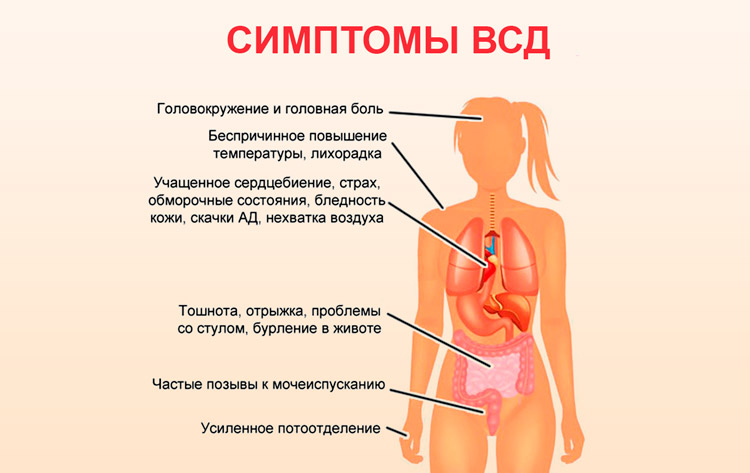
What to do if your heart beats frequently and how to help yourself - such questions are often asked in the office of a cardiologist and therapist, especially in the hot season. A low or high heart rate, as well as other abnormalities in the functioning of the organ, can be caused by a malfunction of the autonomic system. Stop this pathological process It can be difficult on your own, because the person does not understand what has changed his condition, he panics, his breathing becomes difficult, and the situation worsens.
Medicine classifies autonomic system into two parts, sympathetic and parasympathetic. The first department is responsible for the activity of the body, and the second is for relaxation. Due to this, the activity of all organs can change; contraction of the heart also increases or decreases the pace of work.
When a person is diagnosed with VSD (vegetative-vascular dystonia), it often provokes tachycardia. The number of heart beats is calculated by the doctor. A minute is the unit of time in which each organ beat is counted. The norm for such numbers should vary between 60-90 contractions. A slow or accelerated pace of work is often provoked by the vegetative department, but few people realize this. Despite the deterioration in health, tachycardia caused by this influence is not considered dangerous.
Endocrine system
Increased synthesis of certain hormones can cause increased heart rate, and only the doctor decides what to do in this situation after studying the patient’s test results. It is impossible to regulate the production of some enzymes on your own. Hyperthyroidism is one of the diseases in which a similar pathological process occurs. When the secretion of thyroid-stimulating hormone by the thyroid gland is excessive, a person’s condition deteriorates sharply. It is possible to slow down the functioning of the organ only by stabilizing the level of these substances in the blood.
A strong pulse is dangerous when it is periodic, and if the patient is diagnosed with concomitant pathologies of the cardiovascular system, then the health and functioning of all organs worsens.
Symptoms and danger signs
What to do if you have palpitations at home? This depends on the specific symptoms of the disease. There are certain manifestations that do not require medical help. There are serious conditions in which it is necessary to urgently call an ambulance. The clinical picture of the disease can be different, depending on the age of the patient, the general sensitivity of the body or the psycho-emotional background.
Sometimes a person does not feel any unpleasant symptoms with a rapid heartbeat, only mild discomfort in the sternum. Other patients complain of severe pain and severe signs of pathology. In any case, such a condition is accompanied by a rapid pulse, fluttering of the main organ in chest, slowing down its activity, or strengthening.
Additional symptoms: 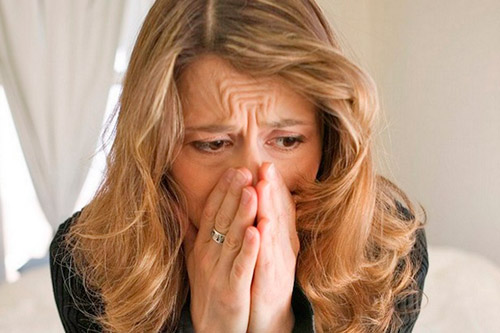
- Weakness, lethargy.
- Feeling of panic or tearfulness, aggressiveness (with autonomic disorders).
- Excessive sweating, nausea, tremors of the limbs, pale skin and low blood pressure (with cardiovascular diseases, hypotension).
- Trembling inside the body, severe or decreased appetite, bulging eyes, increased secretion sweat (for thyroid diseases, thyrotoxicosis or hyperthyroidism).
What to do with a strong heartbeat depends on the pathology that caused the illness. Many factors can trigger the mechanism of increased activity of a department if a person has a certain disease that affects the function of the main organ. Stress and excessive physical activity are contraindicated for people with cardiovascular disorders, as they can cause an increase in heart rate. If such a condition has developed as a result of overeating, then you need to take a horizontal body position. Sometimes certain medications affect the strengthening of the main organ. There are dangerous symptoms, indicating a difficult situation and the need to call a doctor.
When to call doctors?
- Intense pain on the left in the sternum or between the shoulder blades.
- Severe weakness, sudden release of cold sticky sweat, especially in combination with pain.
- Difficulty breathing, feeling of lack of oxygen.
- A suffocating cough that produces pink, foam-like sputum.
- A feeling that the heart beats unevenly, freezes, or may slow down and then sharply increase its activity.
- Darkening of the eyes and fainting.
If a person begins to experience such severe symptoms, we're talking about about complications of the disease that are deadly. Diagnosis and therapy are necessary, and there is no time to waste.
Possible complications:
- myocardial infarction;
- atrial fibrillation;
- venous stagnation of blood;
- ventricular fibrillation;
- extrasystole;
- asystole or cardiac arrest.
The prognosis of the disease depends mainly on the patient himself. The patient needs, at a minimum, to seek treatment in a timely manner medical care so that his condition stabilizes. The main condition for severe tachycardia is to eliminate the danger to life, take medications and the use of all methods of additional treatment (correction of lifestyle, nutrition and activity)
Diagnostics
It is almost impossible to determine the cause of the pathology immediately, at the first examination by a doctor. There are techniques that allow you to examine the patient carefully. There are many triggering mechanisms that influence the increase in heart rate, so a set of diagnostic measures is required.
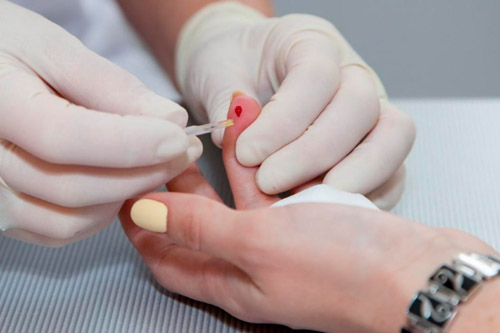 Examination methods:
Examination methods:
- UAC ( general analysis blood). Determines availability inflammatory processes and hemoglobin level in the body.
- OAM (general urinalysis). Detects kidney disease.
- Blood test for infections.
- Biochemical blood test.
- Studying the level of thyroid hormones using a blood test.
- Coronary angiography (for severe conditions).
- Ultrasound examination of the heart.
- Ultrasound of the thyroid gland.
The entire list of diagnostic methods is most likely not needed by every patient. Examinations are prescribed based on patient complaints.
The heart may hurt when the pulse increases, this means the seriousness of the person’s condition.
Treatment
Treatment for rapid heartbeat depends on the causes of the disease. If we are talking about physiological tachycardia, then it is necessary to reduce the influence of irritating factors. When the disease is caused by pathological factors, the doctor will prescribe medications.
Essential medications: 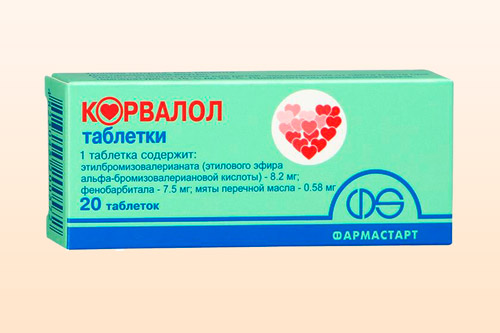
- Sedative medications, synthetic and plant origin(“Novo-Passit”, “Relanium”, “Corvalol”, “Valocordin”, “Peony tincture”, “Moonwort tincture”, “Valerian tincture”).
- Antiarrhythmic drugs (“Adenosine”, “Rytmilen”, “Verapamin”).
The medication must be selected individually by a doctor. Additionally, doctors use physical therapy. In addition, there is more than one traditional method of therapy, but before using any of them you should consult a specialist. In especially severe cases, only surgical intervention, which is performed for organ ischemia, can help. congenital defects or after complex manifestations of rheumatism.
Traditional methods
Few people know how to calm the heartbeat if you are at home. First of all, you need to take each drug from the list of medications prescribed by your doctor, and herbs and other herbal and natural remedies will provide additional help.

Folk remedies have different effects, but the sedative effect in any case will have a positive effect on the functioning of the heart. Additionally, such medications will help improve the functioning of other organs and systems of the body.
Therapeutic exercise and yoga are also often used to improve the condition of a person with tachycardia. Walking in the fresh air and proper nutrition will help organize the work of the main body. Therefore, ways to calm the intensity of the heartbeat depend only on the root cause of the symptoms and test results.
First aid
During an attack of increased heart activity, the skillful actions of the person next to the patient are important. Doctors advise you to calm down. This will lower your heart rate, but many people find it difficult to relax in this situation. When the manifestations of the disease occur at night, first you just need to drink water. First aid for palpitations can save a person's life.
What to do:
- Call an ambulance.
- Tablet sedative will help a person relax.
- Open a window or window.
- To improve the patient's condition, maximum access to fresh air is needed, it is necessary to unbutton his shirt collar, and remove other items of clothing that restrict breathing.
- Take blood pressure measurement.
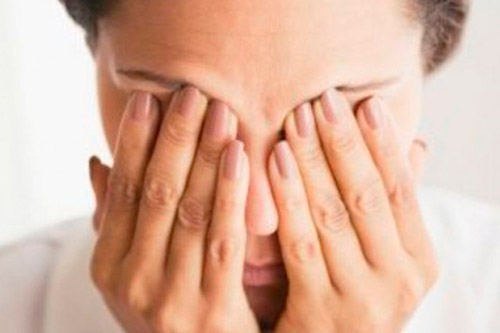
- Spray your face with cool water.
- Apply gentle pressure to the person's closed eyes and hold your fingers there for a few minutes.
- Ask the patient to cough lightly, which will increase the pressure in the sternum and make the rhythm of the organ lower.
These actions are necessary for people suffering from tachycardia due to heart pathologies. Other factors that caused the illness may require other first aid measures.
Preventive measures to both slow down the heartbeat and improve the functioning of the entire system of this department are extremely important. To main body body worked normally, you need to give up bad habits, reduce coffee consumption, and also play sports. Doctors advise undergoing a medical examination at least once a year, this will help identify any disease. early stage and cure it in a short period of time. We must not forget that taking drugs has a negative effect on the functioning of the entire body; amphetamine and other similar drugs increase the heartbeat and gradually kill a person.
Tachycardia usually does not cause serious health consequences, but it is better to find out why this disease appeared. Constantly recurring attacks cannot be ignored; this will worsen the prognosis. Heart problems are dangerous, so you need to solve them quickly and effectively.
- What causes the problem of rapid heartbeat?
- What are the causes of tachycardia (rapid heartbeat)?
- Who is most susceptible to this disease?
Few people have not experienced palpitations, the causes of which were not always obvious. The pulse rises sharply, the vision becomes dark, weakness and dizziness appear, this is also called an attack of tachycardia.
Let's figure out what tachycardia is? These are disturbances in the heart rhythm, characterized by an increase in the frequency of heart contractions. At the same time, it increases to 90 beats in one minute.
For a person, the norm of contractions is 60-90 vibrations per minute, while exceeding the norm up to 100 is not considered critical. The baby has a faster pulse. By about the age of five or six years, this figure is equal to that of an adult and drops. The standard is determined by the World Health Organization.
What causes the problem of rapid heartbeat?
In medicine, there are two causes of heart palpitations:
- physiological;
- pathological
 The first appears in response to the physical or emotional stress that a person experiences. This could be a reaction to a cold or a change in room temperature. Your heart rate may increase when you overeat, drink energy drinks or alcohol, or take certain medications. This is how our physiology adapts to different conditions.
The first appears in response to the physical or emotional stress that a person experiences. This could be a reaction to a cold or a change in room temperature. Your heart rate may increase when you overeat, drink energy drinks or alcohol, or take certain medications. This is how our physiology adapts to different conditions.
A pathological cause can be detected without any special external stimuli, this is how diseases of the cardiovascular system and sometimes other organs manifest themselves. They can be heart defects, myocarditis, cardiosclerosis, blood loss and infection. Then tachycardia is a symptom of the above abnormalities. It is often caused by hereditary predispositions.
Return to contents
What are the causes of tachycardia (rapid heartbeat)?
So, we will try to dwell in more detail on the causes of rapid heartbeat that are not associated with external physiological influences. In these cases, it is associated with malfunctions in the functioning of our body and health problems. If tachycardia occurs at rest, it is a symptom of just such problems. These could be:

At colds and an increase in body temperature caused by the presence of infection, the heart rate increases. Moreover, every 10 beats per minute are added when body temperature rises even by one degree.
Return to contents
Who is most susceptible to this disease?
Most often, it affects those who suffer from chronic sleep deprivation syndrome, which is caused by insomnia and a poorly established daily routine. In this case, the body does not fully rest during short or restless sleep.
This group also includes people whose lives turn into sheer stress caused by problems in the family and at work. Constant conflicts, scandals, difficult relationships with loved ones - all this negatively affects the functioning of the heart.
 Athletes and people engaged in excessive physical activity are also at risk.
Athletes and people engaged in excessive physical activity are also at risk.
This suggests that it is imperative to give the body a rest from physical activity and switch to other activities.
Abnormalities in the heartbeat can cause medicines taken independently without a doctor’s prescription, including antidepressants, alcohol and drugs. You can also add excessive consumption of chocolate, coffee, and tea. However, moderate consumption of these products is not dangerous to health.
People who are overweight are also familiar with this problem. Leads to her increased level cholesterol, as a rule, accompanies extra pounds.
Age is of great importance: the older we get, the more often attacks of tachycardia occur.
There are two main types of this disease:
- sinus;
- ectopic.
The sinus node is the motor heart rate. The impulse generated by it allows the heart muscle to contract. When the activity of this nerve node increases, it appears.
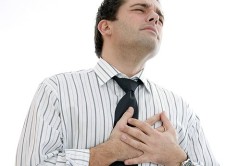 It goes like this: the episode begins and ends gradually, the pulse exceeds 90, while the rhythm remains correct.
It goes like this: the episode begins and ends gradually, the pulse exceeds 90, while the rhythm remains correct.
The causes of ectopic tachycardia lie outside the sinus node. It manifests itself in the form of attacks (paroxysms) that occur suddenly, lasting from several seconds to several days.
So, let's combine the symptoms:
- The main symptom of any type of tachycardia is a rapid heartbeat, often echoing in the neck and head.
- The pulse increases and this continues for more than 5 minutes.
- Dizziness, weakness, darkening of the eyes, and even loss of consciousness may occur.
- Sometimes chest pain occurs. Some patients experience the urge to urinate.
- Deterioration in general well-being and quality of life.
Diagnostics may include:
- electrocardiogram;
- daily ECG monitoring;
- echocardiography;
- electrophysiological study.
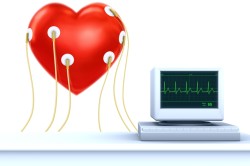 Sometimes a hardware examination is prescribed. Additionally, blood and urine tests are examined, and thyroid hormones are diagnosed. It is important to monitor your blood pressure.
Sometimes a hardware examination is prescribed. Additionally, blood and urine tests are examined, and thyroid hormones are diagnosed. It is important to monitor your blood pressure.
In order to help yourself or others in such a situation before the doctor arrives, you must:
- concentrate and calm down;
- ventilate the room, allowing access to fresh air;
- unfasten the tightening buttons and belts;
- sit down or lie down in a comfortable position;
- take a mild sedative;
- do breathing exercises;
- just drink some water and wash your face or apply a cool compress;
- close your eyes and press lightly on your eyelids thumbs(can be held for 8-10 seconds).
But you can’t cancel the doctor’s call. Even if you feel better, you need to find out the root cause of the disease and prevent the consequences. If this problem is not bothering you for the first time, then you yourself can help the doctor establish the correct diagnosis. To do this, you can carry out simple steps yourself before being examined by a doctor.
Collect detailed information about your health. To do this, remember exactly what you felt and write it down so you don’t forget. You can keep a special diary in which you will record the state of your health. You can put notes on temperature and pressure in it. It is advisable to record such marks in the morning, afternoon, evening and during the attack of tachycardia itself. By measuring the pulse, you can indicate what it is: rhythmic or arrhythmic, weak or full, stable or not, whether it can be easily felt. You must record on paper what preceded the crisis: perhaps a surge of emotions or stress, or a deterioration in nutrition, changeable weather conditions.
Carefully observe the behavior of your body, this will help the treating specialist make the correct diagnosis.
We must not forget that health often depends on ourselves. Take walks in the fresh air more often, exercise therapeutic exercises, preferably under the supervision of a personal trainer. Pay attention to how you eat, think about a diet that is healthy for your health. Drink more fluids, do not forget: the thicker the blood, the harder it is for the heart to pump it through the bloodstream. circulatory system. Many doctors advise drinking at least one and a half liters of water per day. Use it traditional methods to improve your well-being, but do not self-medicate. Be sure to undergo an examination at the clinic and get professional advice from a doctor. Remember: you don't joke with your heart. This is the most important organ in our body.
Fast heartbeat - a phenomenon that many have noticed after a run or during excitement. It becomes more difficult to breathe, the heart beats much more noticeably than usual.
Blood rushes to the face and pulsates in the temples. If this is an intermittent condition caused by adequate reasons, there is no need to worry. But there are also situations when the heart is about to jump out of the chest for no obvious reason.
In this case, you need to understand the problem and, if necessary, contact a specialist.
Causes of increased beating
It is worth remembering that tachycardia takes different shapes in different categories of the population, and for some it may be considered the norm.
In children preschool age the heart beats too often due to the sensitivity of their body to external changes, this is normal. Such attacks are not dangerous and disappear completely with age.
On the contrary, athletes exhibit reduced heart rate (heart rate) characteristics - their heart beats slowly because it is so trained that it can pass the entire volume of blood of 50 beats through itself. In such people, the heart rate increases from 80 beats per minute.
In other groups of the population, the reasons why the heart beats strongly are as follows:
- abuse of energy drinks and tonics containing caffeine;
- use of certain drugs with such side effects;
- taking drugs, smoking, alcohol intoxication;
- a sharp increase in the amount of physical activity;
- emotional overstrain, low stress resistance;
- poor nutrition and, as a result, gastrointestinal dysfunction.
The symptoms of the phenomenon are also different for everyone, the only thing in common is that the heart seems to jump out.
Some of the signs are - serious reason consult a doctor:
- attacks lasting more than 5 minutes;
- loss of consciousness, severe dizziness, darkening of the eyes;
- lack of air;
- systematicity of attacks;
- beating with excessively strong knocks;
- stabbing pain in the chest and especially the heart.
Fast beat with tachycardia
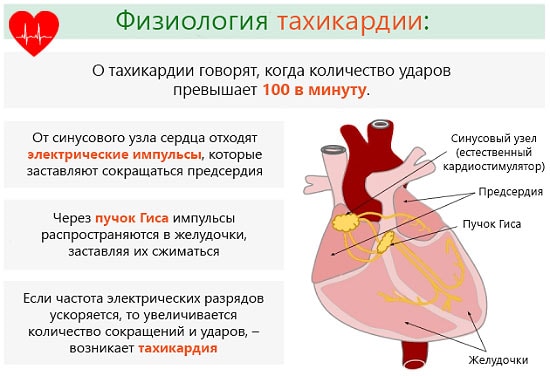
The main reason why the human heart beats faster is tachycardia.
Tachycardia – not necessarily a disease, it is simply a condition in which a person’s heart begins to beat rapidly. Instead of 60-80 beats per minute, which is normal for an adult, there is an increase to 90-100 (and for athletes - from 40 to 80).
Tachycardia has two types, and only one of them is dangerous to health.
The first type of tachycardia is sinus. It occurs after increased stress, with constant stress, short-term excitement. The sinus type can manifest itself during infectious diseases with an increase in body temperature, because with each degree of a person’s temperature, 10 heartbeats per minute are added.
To get rid of the unpleasant sensations and rhythm disturbances associated with it, it is enough to remove the cause of tachycardia. This is easy to do in a calm state. Infrequent attacks of sinus tachycardia should not last more than a few minutes and are accompanied by a beat frequency of no more than 150 beats per minute.
If you experience a faster pulse during heart palpitations, you should immediately consult a specialist. Sinus tachycardia can rarely be caused by serious diseases such as heart failure.
The second type of tachycardia - paroxysmal. With it, the heart beats suddenly, the outbreaks have no apparent reason.
A cardinal difference from sinus is immediately noticeable: the beats are from 140 to 220 per minute, the head becomes very dizzy, and the person very often loses consciousness. This type is also divided into two subtypes, and depending on which one is found in the patient, he undergoes a short-term or long-term course of treatment.
Paroxysmal tachycardia can be atrial or ventricular. The atrial variety is caused bad habits, sleep disorders, improper, polluted environment. After undergoing therapy, it is quite easy to reduce the risk of recurrent attacks.
Ventricular paroxysmal tachycardia is much more serious. With it, the heart begins to beat rapidly due to a number of harmful, sometimes fatal diseases. To find out the exact cause, patients with a heart rate of 140-220 are required to undergo cardiography.
Second reason: anemia
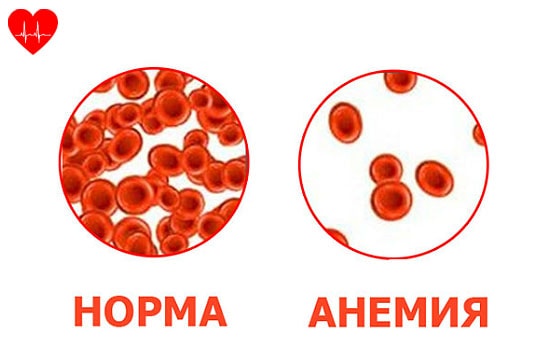
Anemia – lack of iron in the blood. Iron is responsible for correct work heart, maintaining a strong condition blood vessels. Its deficiency leads to general weakness of the body, arrhythmia and other disturbances in heart rhythms.
Anemia can be caused by the following reasons:
- great blood loss. Iron is contained in the blood, and by losing it, a person loses a significant part of this useful element;
- heavy menstruation. The principle is the same: with the loss of blood comes the loss of the element. If menstruation begins to increase sharply, you cannot wait for an attack, you need to immediately call a doctor;
- period of bearing a child. The body of the expectant mother may not immediately adapt to the redistributed blood supply;
- peptic ulcers accompanied by frequent hemorrhages;
- weak, periodically bursting vessels;
- haemorrhoids.
What to do in this situation?
Iron deficiency can be compensated special drugs, as well as food containing it: hematogens, pomegranates, chocolate. Full list necessary products prescribed by the doctor.
Please note: for severe symptoms of anemia, such as loss of consciousness, difficulty breathing and movement, it is not enough to simply consult a doctor. If you find such signs, then hospitalization and, first of all, elimination of blood loss are required.
Hyperthyroidism and leukemia
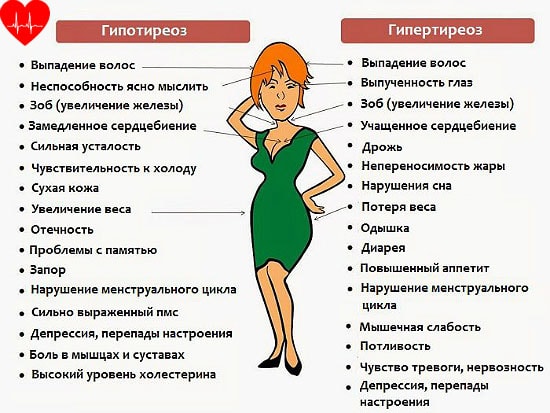
Dysfunctions in the thyroid gland - one of the most common causes of cardiac dysfunction. Teenagers, pregnant women and other people experiencing hormonal imbalance experience severe pounding in the chest, accompanied by sweating and general weakness. But the functions of the thyroid gland can be more seriously impaired.
Hyperthyroidism – one of the causes of arrhythmia. Everyone whose heart beat unevenly experienced arrhythmia.
The development of the disease is stimulated by an increase in thyroid hormones, and when treating hyperthyroidism, they reduce its content in the body. Specialized medications are prescribed, after a course of which improvement should be observed.
At proper treatment tachycardia caused hormonal imbalance, completely passes. If the heart is still beating rapidly, they move on to more drastic methods, such as surgery.
Leukemia – serious illness with fatal outcome. With it, disturbances are observed in the hormonal background, in the number of red blood cells and iron in the blood. The disease is so rare that it can be considered possible reason not worth it.
This type of disease is accompanied by enormous symptoms, and a single heartbeat, even if it is very rapid, is not enough to detect it.
Attack of increased heart rate: what to do?
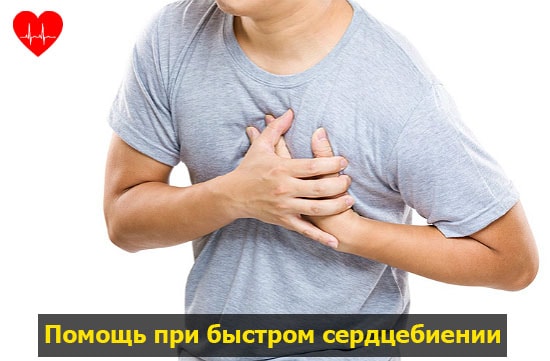
The main question for patients if their heart is beating strongly is what to do?
Don't be nervous. If you are away from qualified specialists, and at this time you are overtaken by an attack of tachycardia, arrhythmia or anemia, your heart is pounding, you should take the following actions:
- find a cool, fresh place, or better yet, go outside. The lower the temperature of the body and environment, the easier it will be to cope with the attack;
- plunge into cool water, and for a longer-lasting effect, make a compress on your head from a damp towel;
- Every minute or two, tense your abdominal muscles for a quarter of a minute.
After five minutes the attack should subside. If no positive changes are observed, the heartbeat is still rapid, you need to urgently go to an ambulance, lie down and wait for medical help. The specialist will immediately begin all the necessary procedures.
